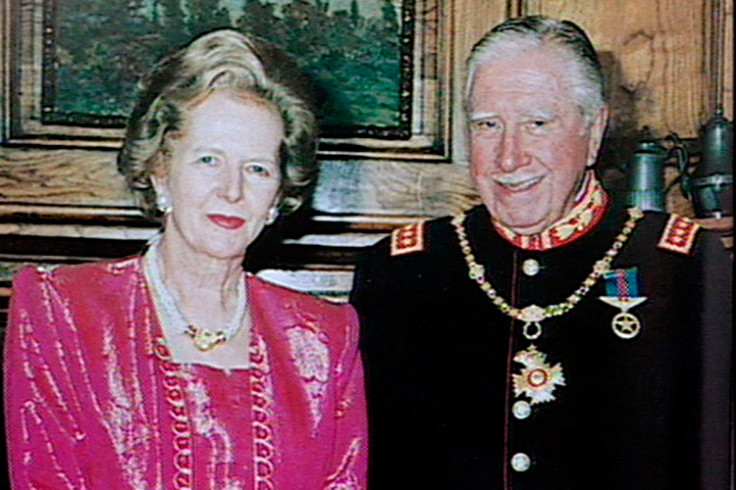Cold Warriors After The 1973 Coup: Why Did Britain’s Margaret Thatcher Support Chilean Dictator Augusto Pinochet?

Forty years after the military coup that deposed the popularly elected Marxist President Salvador Allende and established a brutal military dictatorship under Augusto Pinochet, Chileans remain divided over the general’s legacy.
On the streets of Santiago, up to 8,000 police have clashed with protesters armed with stones and petrol bombs, reflecting the passionate feelings (both pro and con) that Pinochet, who ruled for 17 years, still incites in Chile.
Under the Pinochet regime, thousands of opponents and left-wing activists were arrested, imprisoned, tortured, executed or simply “disappeared.” Many Chileans, including former President Michelle Bachelet, who is running for a comeback in the current, are demanding that the government conduct a thorough probe of the full magnitude of human rights abuses committed by Pinochet and his military officers.
But as a devout anti-Communist, Pinochet enjoyed the support and friendship of a number of Western leaders, including none other than British Prime Minister and Conservative icon Margaret Thatcher.
Pinochet’s relationship with Thatcher remains a sore point for the Conservative Party. Pinochet earned Thatcher’s eternal gratitude by remaining officially neutral during the 1982 Falklands War that pitted the United Kingdom against Chile’s neighbor, Argentina. Thatcher repaid the favor by standing by Pinochet as the general found himself in an international spider web of legal problems, criminal charges related to his rule as well as accusations of massive embezzlement.
In 1990, Pinochet stepped down as president of Chile, but remained commander-in-chief of the military for another eight years, when he was arrested in London over a raft of charges, including various human rights violations. Between October 1998 and March 2000, he remained in the United Kingdom (effectively, under house arrest), a pawn in a diplomatic tussle among Britain, Chile and Spain (who were demanding his extradition), Pinochet finally returned to Chile in the spring of 2000. Over the next six years until his death in December 2006, Pinochet was in and out of courts, and placed under house arrest in 2004. He was never tried in any court for any of his alleged crimes.
As for Thatcher, who died earlier this year, she made a public televised appearance with Pinochet in March 1999 at his Surrey residence (long after her term as prime minister had ended). She praised Pinochet for keeping Chile an ally during the Falklands episode and for bringing “democracy” to Chile.
"I know how much we owed to you for your help," she told her old friend. "The information you gave us, communications, and also the refuge you gave to any of our armed forces who were able, if they were shipwrecked, to make their way to Chile."
(Indeed, the Chilean military reportedly offered intelligence services to British forces fighting the Argentines during the Falkland conflict, despite Santiago’s “neutrality”).
Thatcher, by then a baroness, continued to gush: "I'm also very much aware that it is you who brought democracy to Chile, you set up a constitution suitable for democracy, you put it into effect, elections were held, and then, in accordance with the result, you stepped down."
Pinochet reportedly made many trips to Thatcher’s own home during his stay in the UK, while she strongly advocated for his release from house detention. She also remained a staunch defender of the former Chilean dictator until the end of her life.
Thatcher’s warm ties with Pinochet were widely criticized by many in Britain, including then-Prime Minister Tony Blair who blasted the Conservatives as the “party of Pinochet.”
But Thatcher’s links to Pinochet went far beyond mere pleasant chats over tea and cookies – in 1980, after she gained power in Britain, she lifted an arms embargo against Chile, leading Pinochet to purchase weapons from the UK (which likely persuaded him not to oppose British military maneuvers in Argentine a few years later).
In a bizarre addendum, in the summer of 2013, Thatcher’s relationship with Pinochet was turned into an opera by an Argentine writer named Esteban Buch. The work, called “Allies” played in Paris, Rome and Strasbourg, France.
"The Malvinas [Falklands] War is the experience of my generation of Argentines,” Buch said in the play’s production notes.
“Through Thatcher and Pinochet and the Malvinas War I looked back on my past and the past of my generation," he said in production notes. "I absolutely assume a political, committed message, which is clear.”
Pinochet was not the only foreign dictator that Thatcher either supported or helped – that list would also include Saddam Hussein of Iraq, the Shah of Iran and Suharto of Indonesia, among others.
© Copyright IBTimes 2024. All rights reserved.











